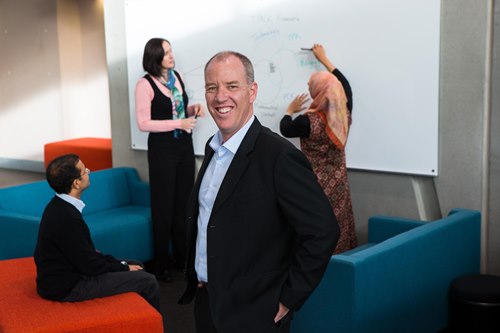Claudia Doman
5 November 2014: Understanding how students process math tasks, managing the threat of invasive weeds, and ensuring inclusiveness in disaster recovery efforts are among the University of Canberra research projects awarded new funding today.
The University received five prestigious Australian Research Council (ARC) grants, including four Discovery Project grants and a Discovery Early Career Researcher Award, worth a total of more than $1.9 million dollars.

|
UC Centenary Professor Thomas Lowrie, one of the recipients of the ARC grants, will investigate how students process mathematical tasks. Photo: Katherine Griffiths. |
University of Canberra Centenary Professor Thomas Lowrie and colleagues received $428,484 to investigate how primary and secondary students process mathematics tasks in digital environments.
"Increasingly, students are required to solve problems in dynamic, interactive ways, often with the support of digital tools such as computers, smart phones and tablets. It is essential we understand the opportunities and challenges of students engaging in dynamic learning environments, especially with enhanced technology," Professor Lowrie said.
His colleagues include Professor Mary Hegarty from the University of California (Santa Barbara) and University of Canberra assistant professor Tracy Logan.
"We will be working with Professor Hegarty, who directs one of the most prestigious spatial reasoning laboratories in the world," Professor Lowrie said. "Her expertise in the science of learning will allow us to develop teaching-learning programs that enhance students' spatial reasoning. Such reasoning is critical for science, technology, engineering and mathematics disciplines."
University of Canberra conservation biologist Richard Duncan was awarded $503,000 to learn more about the threat of invasive plants to native species.
"I'm delighted to receive funding for this project as it provides an exciting opportunity to better understand how we should manage native plant communities that are threatened by invasive weeds," Professor Duncan, from the University's Institute for Applied Ecology (IAE) said.
"Weeds are one of the most costly and significant environmental threats in Australia so we aim to determine how weed species are able to invade into and dominate native plant communities. Understanding this process will provide the knowledge needed to better manage native vegetation in order to minimise the impact of current and future weeds," he said.
Centenary Professor John Dryzek from the Centre for Deliberative Democracy and Global Governance at the University of Canberra's Institute for Governance and Policy Analysis (IGPA) and his team received $369,700 to analyse the communication between citizens and policy makers surrounding a controversial Australian topic.
Using qualitative and large dataset techniques to collect information, Professor Dryzek and his team will develop a deliberative analysis of the controversy surrounding coal seam gas in Australia. The knowledge generated from this exercise will inform efforts of putting deliberative democracy into practice, as well as more effective environmental governance.
Professor Dryzek's team includes IGPA's Dr Selen Ercan, Dr Paul Fawcett and Dr Michael Jensen, and Australian National University's Carolyn Hendriks.
Peter Unmack, landscape geneticist at the University's IAE and colleagues were granted $344,600 to investigate the most abundant, widespread and biodiverse freshwater fishes in southeastern Australia: the carp gudgeons.
These fish are an important forage fish for larger species, such as the Murray cod and studying some of its cryptic species and sexually-parasitic lineages will impact several research fields including evolutionary theory, native fish ecology and the environmental monitoring of the Murray-Darling Basin.
Dr Nicole Curato, postdoctoral research fellow at IGPA received a Discovery Early Career Research Award worth $324,557 to examine how the 'building back better' principle used when recovering from disasters can be applied not only to infrastructure but also to institutions of participatory governance.
Dr Curato will look at the 2013 Typhoon Haiyan in the Philippines case to develop an analytical toolkit that evaluates people's participation in post-disaster reconstruction.
University of Canberra Deputy Vice-Chancellor (Research) Professor Frances Shannon said: "We are delighted our colleagues have been recognised for their remarkable work, particularly in some of our areas of research strength, such as governance, education and environment."
"Our success in these highly competitive schemes is testament to the hard work of our researchers, who continue to contribute towards our growth as a young research institution."


